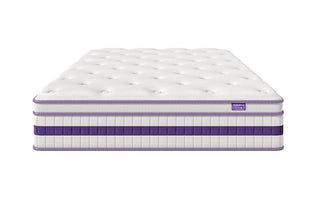Best Mattress for Back Sleepers
We receive free products to review and participate in affiliate programs, where we are compensated for items purchased through links from our site. See our disclosure page for more information.
If you’re a back sleeper, congrats — you’ve already got a leg up on most stomach and side sleepers when it comes to keeping your spine happy and taking the pressure off your joints. But that doesn’t mean just any random mattress will cut it. If you spend the night crashed on your back, a bed that blends cushy comfort with solid support is the sweet spot for keeping your spine neutral and giving your lower back the lift it needs. We did the digging and the hands-on testing to track down the best mattresses for back sleepers, and our lineup covers different budgets, materials, and overall vibes.
The mattresses on this list pulled in seriously strong scores across all our performance tests. However, we really zeroed in on firmness, support, and pressure relief. These are the heavy hitters that determine whether you sleep like a rock or wake up cranky. Considering that mattresses can feel totally different depending on your body type, we tested everything with people of different weights and builds so we could put together a lineup that’s as well-rounded and universally useful as possible.
Bottom Line: What’s the Best Mattress for Couples?
The Helix Dusk Luxe snagged our pick for best mattress for back sleepers overall. It’s a top-tier hybrid with a comfy amount of contouring and standout support, plus a handful of optional upgrades so you can fine-tune your setup.
Best Mattresses for Back Sleepers
- Helix Dusk Luxe – Best Mattress for Back Sleepers Overall
- Nectar Classic Memory Foam – Best Memory Foam Mattress for Back Sleepers
- DreamCloud Classic Hybrid – Best Hybrid Mattress for Back Sleepers
- WinkBed Gravity Luxe – Best Cooling Mattress for Back Sleepers
- Bear Original – Best Value Mattress for Back Sleepers
- Saatva Classic – Best Mattress for Combo Back Sleepers
- Brooklyn Bedding Signature Hybrid – Best Mattress for Combination Back Sleepers
- Avocado Green – Best Organic Mattress for Back Sleepers
How We Picked and Tested These Mattresses
My fellow certified sleep science coaches and mattress testers and I might joke about sneaking in naps on the clock, but we take mattress recommendations seriously. We’ve tested hundreds of beds. Before a mattress earns a spot on a “best of” list, we dig into the brand, look closely at the materials, and run each bed through a lineup of tough tests that we score using our review system. We then compare those results to what’s standard in the industry.
Compare the Best Mattress for Back Sleepers
The Best Mattresses for Back Sleepers: Our Testing Experience
Helix Dusk Luxe – Best Mattress for Back Sleepers Overall

Helix built this upgraded hybrid with back and stomach sleepers in mind. Our crew found it just a notch firmer than medium-firm, giving it a 7 out of 10 on the firmness scale. It really came through on pressure relief, with testers of all body types pointing out solid spinal alignment and a nice, easy contour around the shoulders and lower back when they tried the Dusk Luxe on their backs.
Mattress tester Taylor Reed was especially impressed: “It’s that perfect sweet spot of softness and shaping. The support is awesome, and it fills in that little space under my lower back so well. Plus, my shoulders feel amazing.” Our heavier tester noticed a bit too much sinking, but the bed still scored strong on pressure relief for bigger sleepers, landing a 4 out of 5. Overall, we thought it nailed the mix of firmness and comfort, especially for folks who lean toward a sturdier feel.
The Helix Dusk Luxe also snagged top ratings for cooling and bounce, pulling in 5 out of 5 stars in both areas, and almost perfect edge support with a 4.8 out of 5. That makes it a great match for back sleepers who tend to get hot, like a little spring in their bed, or share space and need that extra edge support. The brand gives you a 120-night trial and a limited lifetime warranty, but a queen-size Dusk Luxe sits on the spendier side. Before any discounts, it goes for about $2,399.
Nectar Classic Memory Foam – Best Memory Foam Mattress for Back Sleepers
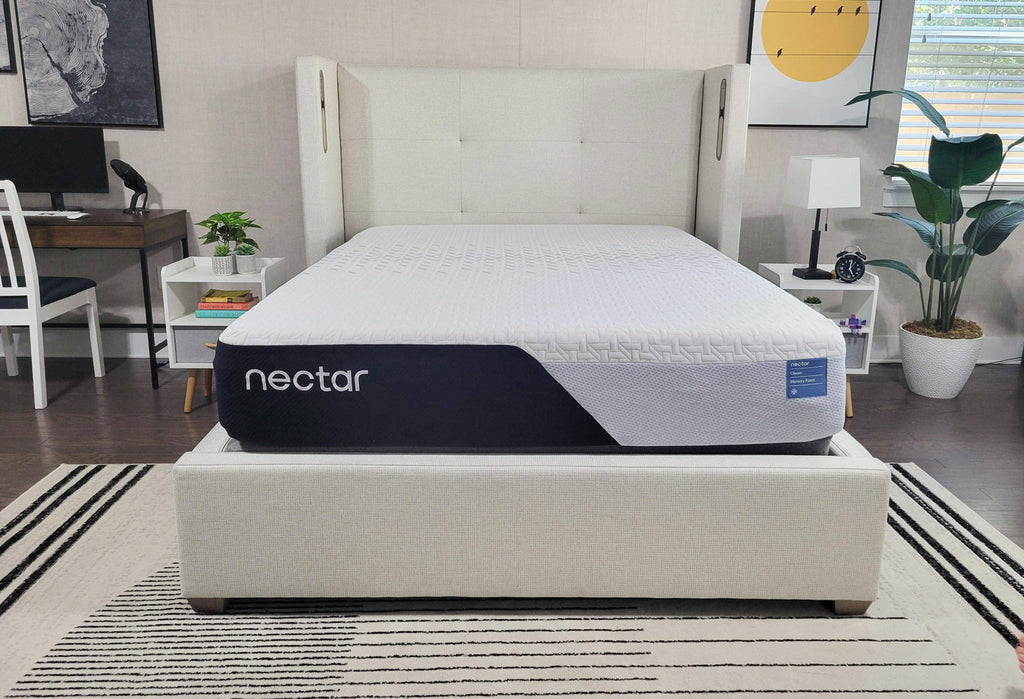
The Nectar Classic is the brand’s main memory foam mattress. It’s a total steal at about $649 for a queen, and it’s got that slow, gooey, melt-into-it kind of feel that old-school memory foam is known for. Mattress tester Jenna Morales said it was super comfy for back sleeping, calling that position “effortless” on the Classic. “The bed molds right into your lower back and fills that little space perfectly, and it gives enough support to stay comfy while still feeling soft,” she said.
At the same time, we noticed the Nectar Classic mixes that squishy feel with a firmer base. We rated it a 7 out of 10 on the firmness scale, which makes it just a bit tougher than your average medium-firm bed. It’s all foam—no coils—but those denser layers underneath help keep your body in a supported position with just a hint of sink. We think it’s a solid fit for average-weight back sleepers between roughly 130 and 230 pounds, though lighter back sleepers might find it doesn’t offer quite enough pressure relief.
The Nectar Classic pulled its best score (5 out of 5 stars) for cooling—which is pretty rare since foam beds usually don’t breathe as well as hybrids. Our testers were also impressed with how well it cut down on motion transfer, which is one of the best parts of memory foam. Couples who tend to wake each other up when they move around should notice the Classic’s motion-absorbing layers really help them stay asleep. And while the mattress didn’t exactly wow us for edge support when sitting on the side, it felt way more stable when lying down on the back.
DreamCloud Classic Hybrid – Best Hybrid Mattress for Back Sleepers
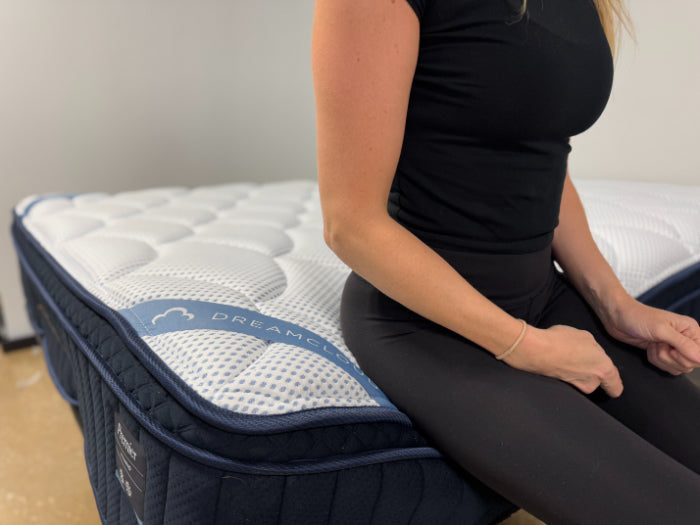
DreamCloud Classic Hybrid
Hybrids usually hit the sweet spot for back sleepers because they mix sturdy coils with comfy foam layers. That’s exactly what’s going on with the DreamCloud Classic Hybrid. It’s a wallet-friendly bed, sitting at about $699 for a queen. However, don’t let that price tag trick you; this six-layer starter hybrid packs a few surprises, landing at least 4 out of 5 stars in every single test we ran.
We found this mattress a good bit firmer than we expected, coming in at a 7.5 out of 10, which might feel a little stiff for some folks. That was true for mattress tester Riley Morgan, but she still said she felt super supported on her back. “I felt really well aligned. It held up my hips perfectly and kept my upper and lower back feeling awesome,” she said. All three testers who tried the DreamCloud Classic Hybrid for pressure relief mentioned great alignment and cozy lower back support with that nice lifted feeling. It means you’re not gonna get that deep, slow-sinking memory foam vibe, even though the top layer is foam.
The Classic Hybrid is also a killer pick for couples. The bed scored high on motion control and cooling with 4 out of 5 stars, and nailed a perfect 5 out of 5 in responsiveness. That means anyone who likes a bouncy, easy-to-move-on kind of mattress will feel right at home.
WinkBed GravityLux – Best Cooling Mattress for Back Sleepers

Back sleepers usually have a lot of body contact with the bed, which can make them heat up faster. The WinkBed GravityLux, even though it’s an all-foam setup, comes with a super breathable cover and cooling gel layers that do a solid job of keeping the warmth from building up.
During testing, we found the GravityLux to be a bit firmer than average, and it really nailed it for back sleepers. Our tester, Taylor Reed, gave it a 7.5 out of 10 on the firmness scale and said, “The top foam layer had just the right amount of cushion, and the support underneath felt almost perfect. I loved how it filled out my lower back. It was like it gently pulled the ache right out of that spot.” The GravityLux comes in a few firmness versions. Our Dweva Review Team tried the medium one, which is labeled as a 5 out of 10 on the firmness scale. The firmer option might be a little too stiff for most back sleepers, but the softer one we tested could be a nice pick for folks who love that fluffy, sink-right-in feel.
Taylor was equally impressed with how well the bed eased pressure when she lay on her back, earning it a full 5 out of 5 stars. “Back sleepers are gonna adore this mattress,” she said. “It hit the perfect balance for my hips—they’re lifted enough but not too high. I feel really aligned and straight.” That wasn’t the same story for everyone, though. Chris Dalton, our heavier tester, mentioned some pressure in his lower back, while lighter tester Megan Ross said she felt tightness in her shoulders and not quite enough softness in the lower back area.
The GravityLux scored 4.6 out of 5 stars for edge support — which is rare for a foam mattress — and it’s super springy and quick to respond, too. We think that bounciness makes it an awesome choice for combo sleepers and couples who are active in bed since it’s easy to move around without feeling stuck.
Bear Original – Best Value Mattress for Back Sleepers
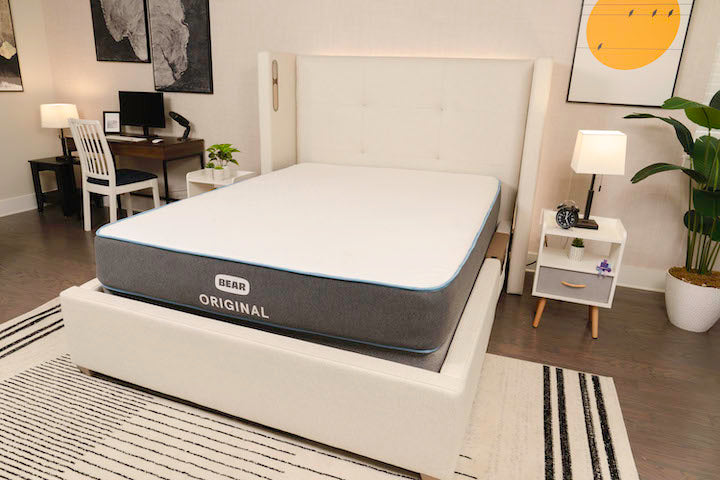
The Bear Original is a memory foam bed that comes in under $700 for a queen, making it a solid pick for back sleepers trying to keep things budget-friendly. Like other mattresses on this list, it leans a little firm, landing at a 7 out of 10 on our firmness scale.
Mattress tester Brooke Lane thought it struck a great balance: “I can feel my hips and backside dip just a touch, but the foam fills in the curve of my lower back perfectly,” she said. “My arms and legs barely sink at all, unlike the heavier parts of me, so it’s a really nice combo of that lifted support for lighter areas and that cozy hug you expect from foam for the heavier ones.”
The Bear Original has a simple four-layer build that helps keep the cost down, but it still gives back sleepers the right amount of support. Tester Erin Price, who switches between her back and side and has slept on the Bear Original for three years, said it’s been a game changer for her back pain. “I wake up with way less tightness in my lower back,” she said.
While the Bear mattress scored strong across the board, its lowest rating was in pressure relief with 3.5 out of 5 stars. Keep in mind, that score is the average from testers of different body types and sleeping positions.
The Original earned 4 out of 5 stars for pressure relief on the back from lightweight tester Megan Ross, who said it molded really well to her shape. Our heavier tester also gave it 4 out of 5 stars in that same position, so we’d say this bed offers plenty of relief for most back sleepers.
Most folks who tend to heat up at night should still feel comfy on the Bear since it pulled in 4 out of 5 stars for cooling. However, really warm sleepers might prefer the extra airflow that comes from the pocketed coils in hybrid models.
Saatva Classic – Best Mattress for Back Sleepers with Back Pain
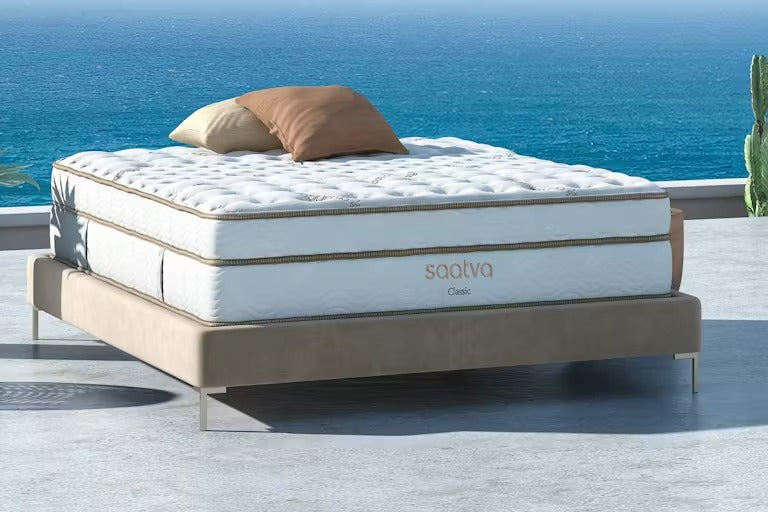
The Saatva Classic is a high-end mattress that comes in several firmness levels and two height options to fit different comfort needs. However, don’t stress about picking between the Saatva setups; we found that each one gives awesome lower back support to help keep your spine in line. That includes a built-in spinal wire, cooling gel-infused memory foam, and extra reinforcement right through the middle section of the cushy pillow top.
We tried out the Luxury Firm model, which our in-house tester Brooke Lane rated a 7.5 out of 10 on the firmness scale. She said she felt lifted and well supported; anyone dealing with back pain should appreciate that mix of structure and comfort. Even though this bed leans on the firmer side, the plush pillow top adds just enough contour to make it one of the best options for easing back tension.
The Classic pulled in top marks for pressure relief from all our testers, including perfect 5 out of 5 stars from both average-weight and heavier sleepers while lying on their backs. “The mattress cradles my lower back in a way that takes the strain off,” said one of our expert testers. “My hips and shoulders feel perfectly lined up. It gives great support without feeling rock-hard or squishy.”
Chris Dalton, our heavier tester, was equally wowed: “I could tell right away my body felt aligned. It’s like that satisfying stretch when you haven’t stretched in ages. Nothing sinks more than it should. Overall, I feel totally supported, everything’s in line, and there’s definitely some relief from the aches.”
One heads-up: the Saatva Classic is an innerspring mattress, so it’s got that signature springy bounce to it. We rated it 2.7 out of 5 for motion isolation, so light sleepers who wake up easily when their partner moves might want to keep that in mind.
Brooklyn Bedding Signature Hybrid – Best Mattress for Combination Back Sleepers
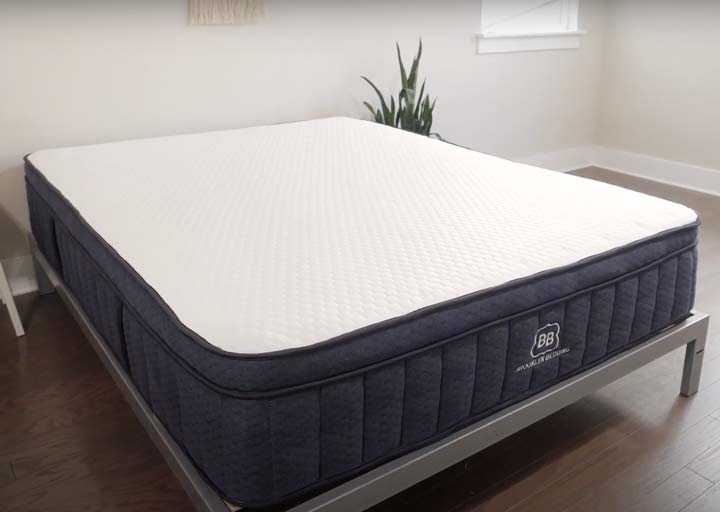
Brooklyn Bedding Signature Hybrid
Not everyone who sleeps on their back stays that way all night. Back sleepers who roll onto their sides need a mattress that can handle both positions (and give a nice bit of bounce), and we think the Brooklyn Bedding Signature Hybrid totally fits the bill.
Brooke gave the bed 4 out of 5 stars for responsiveness, thanks to its springy coil design. She mentioned it took a little more effort to shift from her stomach to her side, but anyone who flips between back and side should still move around without much trouble.
While the mattress feels similar to others on our list at a 7 out of 10 on the firmness scale, it performed great for pressure relief with average-weight back and side sleepers. Our tester gave the Signature Hybrid a full 5 out of 5 on her back and said she felt almost no pressure at all. On her side, she rated it 4 out of 5 and mentioned that her alignment felt spot-on with a nice bit of contour.
Combination sleepers tend to move more during the night, so motion isolation matters. This bed mixes plush foams with sturdy coils, and it earned 4 out of 5 stars in our motion transfer tests. Brooke said most of her partner’s movements were softened by the top foam, though she could still feel him getting in and out of bed. She did admit she’s pretty sensitive to movement, so heavier sleepers probably won’t notice much at all.
The BB Signature Hybrid comes in three firmness choices and is fairly priced at around $1,332 before any discounts. On the downside, the trial run is only 120 nights, which isn’t quite as long as some of the others we’ve reviewed.
Avocado Green – Best Organic Mattress for Back Sleepers

The Avocado Green is a latex mattress made with all-organic materials, making it an eco-conscious alternative to the typical bed-in-a-box. It comes with a long list of impressive certifications: Global Organic Textile Standard (GOTS), Global Organic Latex Standard (GOLS), OEKO-TEX Standard 100, GREENGUARD Gold, Made Safe, Forest Stewardship Council (FSC), and a few more.
These credentials highlight the bed’s sustainability, long-lasting build, safety, and ethical sourcing. For back sleepers especially, the Avocado Green gives amazing support thanks to its ergonomically zoned coil system.
The Avocado Green comes with a naturally firmer feel, landing at a 7 out of 10 on our firmness scale. Mattress tester Erin Price, who says she’s both a back and side sleeper, mentioned it gives really solid support for people who like their mattress a bit firmer. Even so, the combo of latex foam and coils still manages to deliver some nice pressure relief.
Our testers of all body types gave the mattress great ratings while lying on their backs. “This bed definitely supports my lower back,” said Chris Dalton, our heavier tester. “I still feel like I’m resting on top of the mattress, not sinking into it, but there’s still some solid contouring and support here. My spine feels straight and comfortable.” Our lighter tester on the Dweva Review Team called the Avocado Green one of the coziest mattresses she’s ever tried for back sleeping.
The one downside to latex is that it’s pretty springy. The Avocado got 3 out of 5 stars for motion isolation, making it better for solo sleepers or couples who don’t wake up easily. It earned strong edge support scores with 4.6 out of 5 stars, giving couples more usable space and making it super steady when getting in or out of bed.
Nolah Natural – Best Mattress for Back Pain
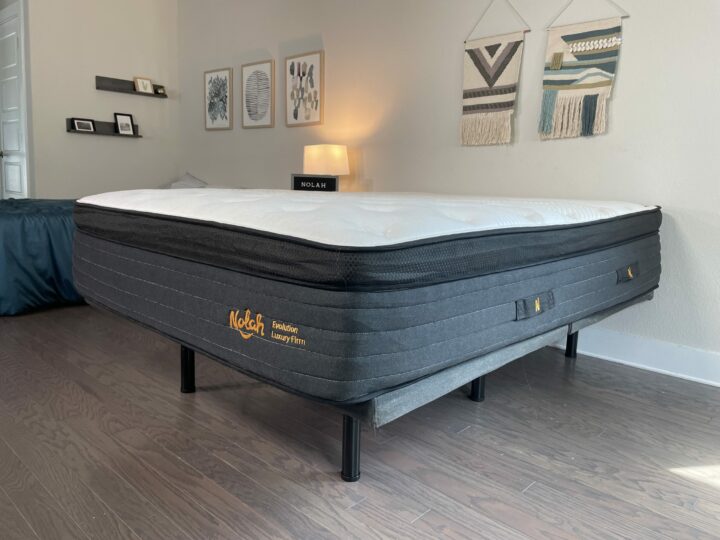
Compare Performance Scores of the Best Mattresses for Back Sleepers
| Mattress Model | Overall | Pressure Relief | Edge Support | Cooling | Motion Isolation | Response |
|---|---|---|---|---|---|---|
| Helix Midnight | 4.3 | 4.5 | 4.4 | 3.5 | 4 | 4 |
| DreamCloud | 4.8 | 4.8 | 4.5 | 4.0 | 4.5 | 4.0 |
| Nectar Premier | 4.0 | 4.5 | 4 | 4 | 4.5 | 3.5 |
| Leesa Sapira Chill | 4.3 | 4.5 | 4.3 | 4 | 3.8 | 4 |
| WinkBed | 4.1 | 3.8 | 4 | 4 | 3.7 | 3 |
| Saatva Classic | 4.6 | 4.5 | 5 | 4 | 2.7 | 5 |
| Silk & Snow Hybrid | 4.4 | 4.7 | 4.5 | 3.6 | 4 | 3.9 |
| Brooklyn Bedding | 4.6 | 4 | 4.4 | 4.5 | 4 | 5 |
| Bear Elite Hybrid | 4.4 | 4 | 4.6 | 2.5 | 4 | 5 |
| Nolah Evolution | 4.3 | 4.5 | 4.6 | 4 | 5 | 4 |
| Birch | 4.6 | 4.2 | 4.8 | 4.4 | 4.5 | 4.2 |
| Brooklyn Bedding Titan | 3.9 | 3.3 | 3.2 | 3.5 | 4.3 | 4 |
Other Mattresses for Back Sleepers We Researched
We tested a whole bunch of solid mattresses for back sleepers, and we honestly found it a little tricky to narrow down our final lineup. Here’s what else we kept in mind while putting our recommendations together.
- Birch Natural – The Birch Natural is a nice stand-in for the Avocado Green, since it’s built with organic, natural goodies. It lands at a similar firmness level at 7/10 on our firmness scale, and we were impressed by how airy it felt and how sturdy the edges were. While we think it could absolutely work for some back sleepers, you’ll also see it show up on our list of the best mattresses for stomach sleepers.
- Nolah Evolution – This high-end mattress comes in multiple firmness options to fit different sleep preferences. We especially liked its great lumbar support and the zoned foam-and-coil setup, which tags in to boost pressure relief. Ultimately, we didn’t include it because the price tag is on the steeper side. A queen runs over $2,200 before discounts, and the optional cooling pillow top adds another $195 to the bill.
- Brooklyn Bedding Aurora Luxe – Another hybrid that lets you pick your firmness level. It mixes coils and memory foam in a way that gives back sleepers a sturdy lift in the lumbar area and a soft, cozy feel around the shoulders. It also seriously impressed us with its cooling chops. But it does have some obvious off-gassing, and it doesn’t offer enough support for heavier sleepers over 230 lbs.
What Matters Most in a Mattress for Back Sleepers
We assess mattresses across a bunch of performance categories, including edge support, cooling, and motion isolation, using our full-on, super-detailed testing process. Additionally, we check in with medical pros to make sure our picks line up with the most current research. For back sleepers, our chief medical advisor emphasized that they "should focus on a medium-firm mattress to ensure proper spinal alignment and support." He also recommended paying attention to mattresses that come with extra features aimed at supporting the lumbar region (lower back). Keeping these expert notes front and center, we prioritized the following qualities in our final choices:
How We Tested the Best Mattresses for Back Sleepers
Back sleepers are in a league of their own when it comes to the kind of support, pressure relief, and just-right firmness they need. It’s a weird little balancing act, but the best mattresses nail it without breaking a sweat. Below, I’ll break down what we looked for in each of these categories to track down the best beds for back sleepers.
What To Consider When Buying A Mattress
Aside from making sure your bed actually feels good and holds you up right, back sleepers might have other wants—stuff like how the mattress performs or even how much it costs—that can totally change how the bed feels and whether it’s going to play nice with back sleeping. I’ll walk you through a few extra things you should keep in mind before you lock in your final pick.
Best Mattress for Back Sleepers FAQs
References








